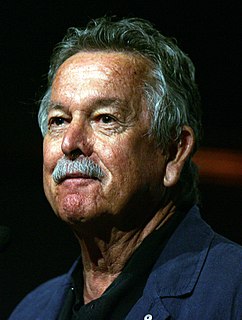A Quote by Yusef Komunyakaa
Students often have such a lofty idea of what a poem is, and I want them to realize that their own lives are where the poetry comes from. The most important things are to respect the language; to know the classical rules, even if only to break them; and to be prepared to edit, to revise, to shape.
Related Quotes
Often poetry, especially the sort of poetry I write, is concerned with looking at the borders between the sensual and the spiritual and seeing them as divided, equivocal, that mystery somehow can break in to the ordinary. And we read poetry I think in part, to gain a sense of that intimacy with things that we can't understand that are unable to be understood but that buoy up our lives.
Poetry is perhaps the oldest art form. We can go back to an age-old idea of naming things, the Adamic impulse - to give something a name has always been an immensely powerful thing. To name something is to own it, to capture it. A poem is still a kind of spell, an incantation. Historically, a poem also invoked: it was a blessing, or a curse, or a charm. It had a motile power, was able to summon something into being. A poem is a special kind of speech-act. In a good poem there's the trance-like effect of language in its most concentrated, naked form.
In the times in which we live it is far too restricting to say that art can only be found in art galleries and not touch people's everyday lives. I want to use any means that are necessary to communicate with people what I feel about things. There are no rules. And if there are rules, then you may as well break them.
Many of our students want to do what they have done and that has made them successful thus far in their lives: play by the rules, and do what is expected. But as much social science research and writing by Malcolm Gladwell, among others, make clear, the rules are mostly created by those already in power so obtaining power often entails standing out and breaking rules and social conventions.
I should think that many of our poets, the honest ones, will confess to having no manifesto. It is a painful confession but the art of poetry carries its own powers without having to break them down into critical listings. I do not mean that poetry should be raffish and irresponsible clown tossing off words into the void. But the very feeling of a good poem carries its own reason for being... Art is its own excuse, and it’s either Art or it’s something else. It’s either a poem or a piece of cheese.
I have spoken all over the world and I have great respect for Muslims, I have great respect for the African people, I have respect for the other races. Even back home in Lousiana, I'm called a racist, but I have respect for the Black people of my country and I want them to have their own life, too, and I want them to be able to pursue their own destiny and not be controlled, and not be damaged.
The subject of the poem usually dictates the rhythm or the rhyme and its form. Sometimes, when you finish the poem and you think the poem is finished, the poem says, "You're not finished with me yet," and you have to go back and revise, and you may have another poem altogether. It has its own life to live.
In all my documentaries, I have great respect for the people I work with. Really, I love them. And it's very important for me that when I finish a movie, they stay my friends. It's important that they won't feel that I in any way manipulated them or showed them in a bad light. I want to show them in all their reality - not as subjects but as people with flesh and blood - but I want to do this with all my respect.
Introduction To Poetry I ask them to take a poem and hold it up to the light like a color slide or press an ear against its hive. I say drop a mouse into a poem and watch him probe his way out, or walk inside the poem's room and feel the walls for a light switch. I want them to waterski across the surface of a poem waving at the author's name on the shore. But all they want to do is tie the poem to a chair with rope and torture a confession out of it. They begin beating it with a hose to find out what it really means.
Italian is a very different poetic situation and there are these hard and fast rhythmic periods, settenari, ottonari of seven and eight syllables. These are fundamental to the way people speak and write and breaking them is more radical in Italian than when we break a line. I'm sure there are Italian poets who want to write poetry as prose and break these Petrarchan rules. And breaking them is fun and a valid thing to do. But I'm more interested in trying to write poetry that absorbs tradition and uses it in new ways, and doesn't throw it out.





































